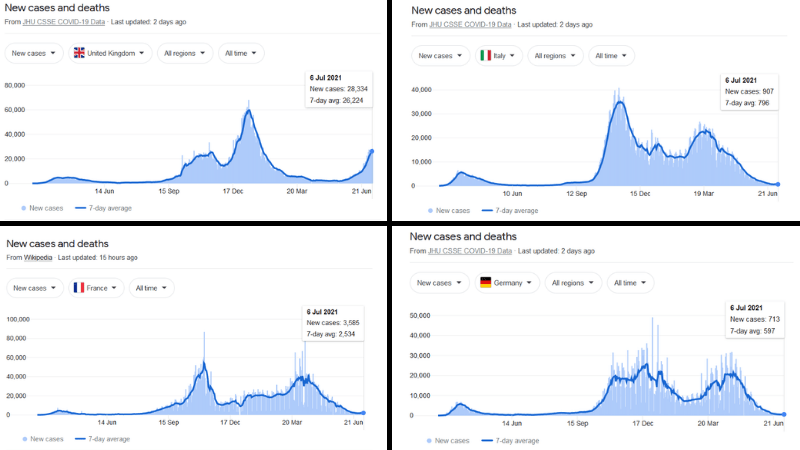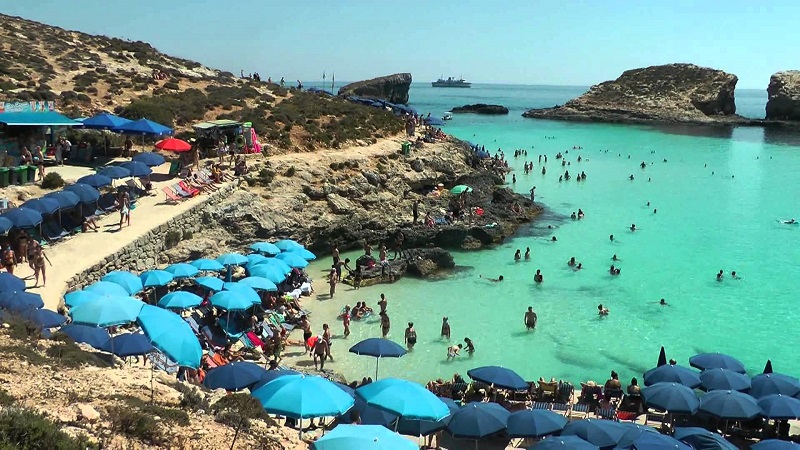As the summer tourism season opens and Malta’s economy prays for tourists arrivals to replenish COVID-depleted coffers, Malta’s largest inbound tourism market, the UK, is facing tens of thousands of daily COVID cases as the Delta variant of the COVID-19 virus spreads throughout the country.
On 6 July alone, John Hopkins University, one of the main data-centres for daily cases that was referred to throughout the whole pandemic, stated that the UK saw 27,100 cases, with a total number of 489,206 known active cases on Tuesday.
While Malta has insisted that travelers from the UK and any other country will only be admitted to the country if they carry a vaccination certificate and a valid PCR test, the rapidity of the spread of the Delta variant coupled with the fact that COVID vaccines do not guarantee total immunity from the virus or the possibility of carrying it has raised concerns.
Meanwhile, in nearby Tunisia, cases have also been rising dramatically. According to an Africa News report, four of the country’s regions, Beja, Siliana, Zaghouan and Kairouan have had to go in full lockdown as the country saw its highest COVID-19 numbers to date, with 7,930 cases on 6 July.
However, it seems that the situation has become steadier in the other three main inbound tourist markets for Malta, which could prove to be a lifeline for the economy after industries such as the hospitality and catering sectors keeled over from the significantly reduced cash flow throughout 2020.

Graphs demonstrating the amounts of daily reported cases in Malta’s four major tourist markets.
Top left: UK
Bottom left: France
Top right: Italy
Bottom right: Germany
In 2019, considered to be one of Malta’s record years for inbound tourism, the island received 616,928 tourists from the UK alone, according to the National Statistics Office. Italy took second place with 371,917 visitors, followed by France with 227,631 and Germany with 201,348.
In Italy, which had seen one of the worst rates of infections and deaths attributed to COVID-19 last year across the EU, just 907 new cases were recorded on July 6. Germany reported similarly low numbers, with 713 new cases recorded on July 6. France, with a population size almost equal to the UK’s, reported 3,585 cases yesterday.
As for vaccination rates, 50.7% of citizens in the UK are fully vaccinated. Italy has so far managed to fully vaccinate 34.6% of its population, while France clocking in at a slightly lower 34.3%. In Germany, 39.3% of the population has been vaccinated so far.
According to Eurostat, Malta was the hardest-hit economy in terms of loss of revenue normally generated by tourism activities over the course of 2020, a year which will be forever marred by the closure of air and sea borders across the globe as well as lock downs, mandatory face masks and social distancing protocols.
From April 2020 to March 2021, Eurostat estimated that Malta saw a decrease of overnight stays of around 80%, a devastating blow to a sector that fueled 11.6% of Malta’s GDP in 2019.
As of Wednesday 7 July, official COVID-19 statistics for Malta showed that infections have crept up to over 100 active cases, a number not seen since 20 May of this year.
Malta’s active cases now stand at 110 after 25 new cases were reported overnight on 6 July.
Speaking at a press conference earlier on Wednesday, health minister Chris Fearne said that three people are currently hospitalised due to COVID-19, all of whom had not been vaccinated.
Fearne also reiterated his previous statements that 90% of active cases seen over the first week of July were also people who have not yet been inoculated.













